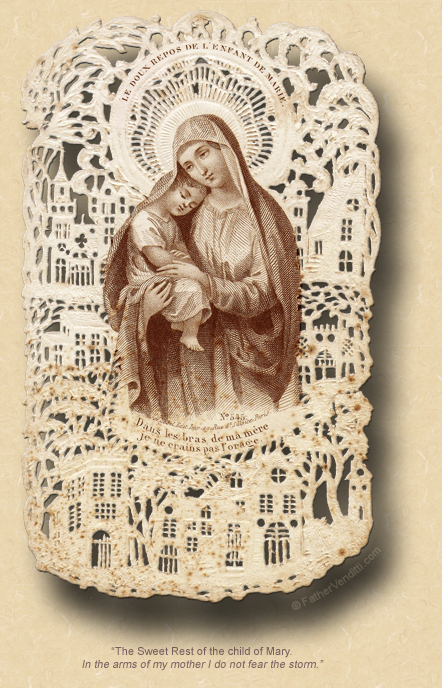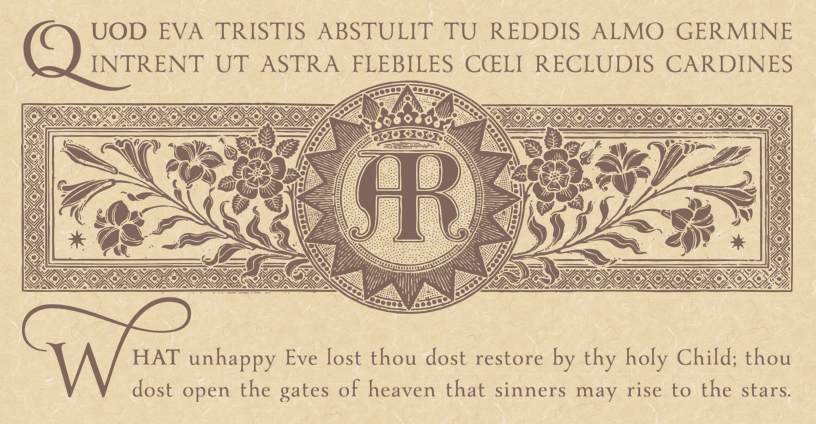"Doctor, It Hurts when I Do This…."
The Twenty-Seventh Saturday of Ordinary Time; the Memorial of Saint Callistus I, Pope & Martyr; or, the Memorial of the Blessed Virgin Mary on Saturday.*
Lessons from the primary feria, according to the ordinary form of the Roman Rite:
• Joel 4: 12-21.
• Psalm 97: 1-2, 5-6, 11-12.
• Luke 11: 27-28.
|
When a Mass for the Martyr is taken, lessons from the feria as above, or from the proper:
• I Peter 5: 1-4.
• Psalm 40: 2, 4, 7-11.
• Luke 22: 24-30.
…or any lessons from the common of Martyrs for One Martyr, or the common of Pastors for a Pope.
|
|
When a Mass for the Mother of God is taken, lessons from the feria as above, or any lessons from the common of the Blessed Virgin Mary.
|
The Third Class Feast of Saint Callixtus, Pope & Martyr.
Lessons from the common "Si díligis me…" of One or Several Holy Popes, according to the extraordinary form of the Roman Rite:
• I Peter 5: 1-4, 10-11.
• Psalm 106: 32, 31.
• Matthew 16: 13-19.
The Eighteenth Saturday after Pentecost; the Feast of the Holy Martyrs Nazarius, Gervase, Protasius & Celsus; the Feast of Our Venerable Mother Paraskevia of Trnovo; and, the Remembrance of the Passing of the Blessed Martyr & Priest Roman Lysko.
First & third lessons from the pentecostarion, second & fourth from the menaion for St. Paraskevia, according to the Ruthenian recension of the Byzantine Rite:
• I Corinthians 15: 58—16: 3.
• II Corinthians 6: 1-10.
• Luke 6: 1-10.
• Luke 7: 36-50.
FatherVenditti.com
|
 8:00 AM 10/14/2017 — As you know, whenever it's a Saturday and there's no saint for the day—or if the memorial for the day’s saint is optional, as Saint Callistus’ is today—we try to observe the Saturday Memorial of the Mother of God here at the Shrine, and that opportunity couldn't have come at a more propitious time, as there's so much we have to place in the lap of our Blessed Mother—which is why I’ve chosen to offer today the Votive Mass for Mary, Mother of Divine Hope. Father Paul, who now lives in a nursing home, made me laugh one day when he was still living with me: I had steamed us some fish for dinner and, after dinner, he wood usually go to watch the news; and, this particular night he got up from the table and said, “Well, time to go see who shot whom today.” And isn't it the truth? Every time we turn on the TV someone is shooting someone, or police are searching for someone, or large numbers of people are protesting something or other. 8:00 AM 10/14/2017 — As you know, whenever it's a Saturday and there's no saint for the day—or if the memorial for the day’s saint is optional, as Saint Callistus’ is today—we try to observe the Saturday Memorial of the Mother of God here at the Shrine, and that opportunity couldn't have come at a more propitious time, as there's so much we have to place in the lap of our Blessed Mother—which is why I’ve chosen to offer today the Votive Mass for Mary, Mother of Divine Hope. Father Paul, who now lives in a nursing home, made me laugh one day when he was still living with me: I had steamed us some fish for dinner and, after dinner, he wood usually go to watch the news; and, this particular night he got up from the table and said, “Well, time to go see who shot whom today.” And isn't it the truth? Every time we turn on the TV someone is shooting someone, or police are searching for someone, or large numbers of people are protesting something or other.
It's very easy to watch the news and become upset or depressed or angry or all of the above, and to think that the world is simply coming apart at the seams; but is it really? I actually had a conversation not long ago with someone who was complaining about how upset he was about everything that he was seeing in the news, and I don’t think he was expecting the advice I gave him, because my advice to him was to switch it off. It’s like that old joke where the man goes in to see his doctor and he says, “Doctor, it hurts when I do this.” And the doctor replies, “Then, don’t do that.” If watching the news upsets us, why is the advice to simply turn it off not acceptable to us? Because we’re afraid that if we do, we’re going to miss something; or, maybe its because we've convinced ourselves that, if we don't keep ourselves informed, that means we're apathetic and don't care.
But what is it exactly we think we’re going to miss, and what do we think we can do about it? Some of you may be old enough to remember when television news first started. TV networks first began broadcasting news in the mid to late 1950s; before then, you got your news either from the paper or from the newsreel at the movie theater. For almost twenty years, the CBS Evening News consisted of Edward R. Murrow reading headlines from the papers for fifteen minutes, without commercials, followed immediately by that week's episode of "Milton Berle." There were no pictures, no reporters "on the scene," no experts to tell us what it all meant; and it was over in a quarter of an hour. Was that because there was much less going on than there is now?
Before he died, Murrow was very candid about the debate that went on at the time as to whether this new thing called "Television Journalism" should become commercial. The networks that broadcast news reports did so gratis; there was no revenue generated by it. Some—including Murrow—thought it would be a mistake for news to attempt to make money because it would corrupt it's objectivity. The decision to advertise on news broadcasts extended the time needed from fifteen minutes to a half hour; and, suddenly, finding ways to make people watch your channel instead of the other guy's became important. Hence, live reports from the scene, expert commentary, human interest ("Here's a neighbor who will tells us what a nice quiet man the ax murderer was," or "How do you feel about your children being eaten by a python?"), and, eventually whole shows devoted to commentary, none of which contributed in any way to the transmission of essential and needed information, but hopefully made the whole thing more riveting than than the other channel.
When twenty-four hour cable news channels first appeared some twenty years ago, the idea wasn't that anyone would watch the news for twenty-four hours; the idea was that people could catch ten or fifteen minutes of essential news when they had time to watch it, instead of having to schedule their day around some broadcast, not that anyone would actually watch the news for twenty-four hours.
Journalism is not a public service; it’s a business. It makes its money by selling advertising, but advertising doesn’t make any money unless a lot of people are watching. So, the talking head spouting news at you has a commercial interest in doing everything he can to make sure your eyes and ears are glued on him and his channel as often and as long as possible.  So, no matter what is actually happening in the world—or not happening as the case may be—he’s got to find a way to make sure you think the world is falling apart, and you’d better darn well watch it or you’re gonna miss it. If he’s got footage of some explosion or mass murder, he’ll play it for you over and over again, each time embellishing it with even more intense descriptions of the carnage; then he’ll truck out the ubiquitous panel of experts and analysts and retired generals who will each tell you how this is, indeed, the most important and critical thing that has ever happened in the history of the universe. If there's some sort of standoff with some gunman, or there's a manhunt going on, if you so much as leave to go to the kitchen and get a Coke, you’ll be sorry because you’ll miss the end of the world. Maintaining our spiritual equilibrium and tending to our interior life is difficult enough in today's hectic world; allowing ourselves to become saturated with information overload in the form of this kind of mercenary propaganda makes it practically impossible. So, no matter what is actually happening in the world—or not happening as the case may be—he’s got to find a way to make sure you think the world is falling apart, and you’d better darn well watch it or you’re gonna miss it. If he’s got footage of some explosion or mass murder, he’ll play it for you over and over again, each time embellishing it with even more intense descriptions of the carnage; then he’ll truck out the ubiquitous panel of experts and analysts and retired generals who will each tell you how this is, indeed, the most important and critical thing that has ever happened in the history of the universe. If there's some sort of standoff with some gunman, or there's a manhunt going on, if you so much as leave to go to the kitchen and get a Coke, you’ll be sorry because you’ll miss the end of the world. Maintaining our spiritual equilibrium and tending to our interior life is difficult enough in today's hectic world; allowing ourselves to become saturated with information overload in the form of this kind of mercenary propaganda makes it practically impossible.
My point is simply this: world events are not unfolding any faster than they have in the past, there are no more frequent tragedies than there were in the past, and the world is not falling apart at the seams. If it seems that way, that’s because the events of the day are being packaged and repackaged in an ever increasing sensationalistic way for the purpose of doing exactly what they're doing: causing us to park our rear ends in front of the TV, getting us all hot and bothered over events about which we can do nothing … nothing, or course, except pray, which we should be doing every day anyway. So, the advice of the doctor in the joke is actually quite sound: “Doctor, it hurts when I do this.” “Then, don’t do that.”
“Father, I get upset when I watch the news.” “Then, don’t watch the news.” I can guarantee that, if the world comes to an end, you’re not going to miss it because you weren’t watching the news. Every day we ask the Mother of God to “turn Thine eyes of mercy towards us” as we suffer in this “valley of tears”; and, what is it we ask Her to do whenever we pray the Hail, Holy Queen? We ask Her to “show unto us the Blessed Fruit of Thy womb, Jesus.” We shall see Him in just a few moments in the Most Blessed Sacrament of the Altar; and, there, right before us, we will have the answer to everything going on in the world that upsets us.

* The creator of the Ember Fast days, still observed in the extraordinary form, Callistus I (sometimes spelled Callixtus) had a tumultuous papacy during which he incurred criticism from such Fathers of the Church as Tertullian and St. Hippolytus for his handling of the lapsi controversy. He organized the first official Christian cemetery in Rome, known today as the Catacomb of St. Callistus, and suffered martyrdom himself in the year 222.
|

